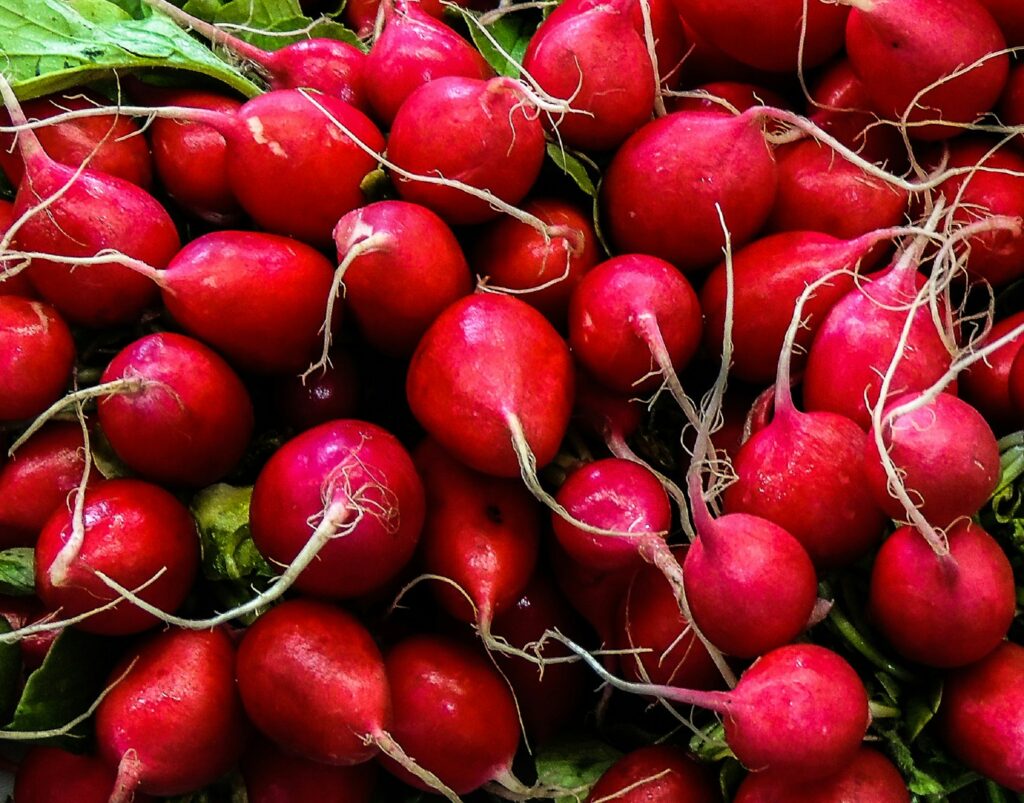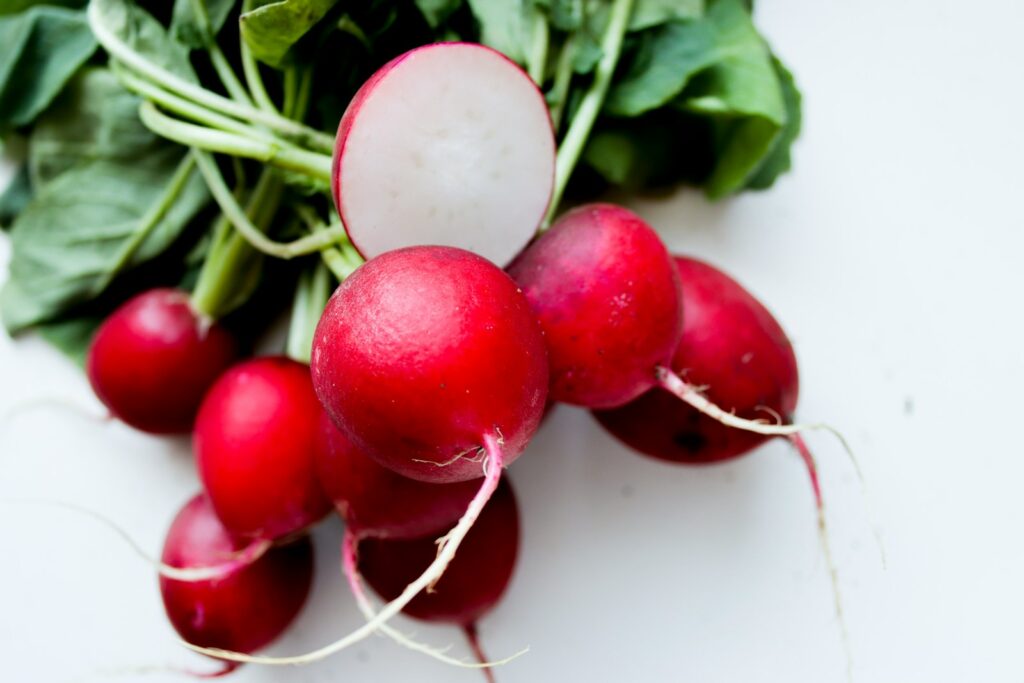Radishes are a vibrant, crunchy root vegetable that often fly under the radar in the world of healthy eating. With their peppery flavor and satisfying crunch, radishes are not only a delicious addition to salads and dishes but also a nutritional powerhouse. Packed with vitamins, minerals, and antioxidants, radishes offer a range of health benefits.
Whether you enjoy them raw, roasted, or pickled, understanding their benefits, how to use them, and any potential contraindications can help you make the most of this underrated veggie.
Let’s dive into the world of radishes!
What are Radishes?
Radishes (Raphanus sativus) are root vegetables belonging to the Brassicaceae family, which includes broccoli, cabbage, and kale. They come in a variety of shapes, sizes, and colors, including the common red globe radish, daikon (white radish), black radish, and watermelon radish. Radishes are known for their crisp texture and spicy, slightly peppery flavor, which mellows when cooked.
Nutritional Profile of Radishes
Radishes are low in calories but rich in essential nutrients. A 100-gram serving of raw radishes provides:
- Vitamin C: Boosts immunity and skin health.
- Fiber: Aids digestion and promotes gut health.
- Potassium: Helps regulate blood pressure and heart health.
- Folate: Important for cell division and preventing birth defects during pregnancy.
- Antioxidants: Protect cells from damage and reduce inflammation.
- Water Content: Keeps you hydrated and supports overall health.
7 Benefits of Radishes
- Supports Digestive Health
Radishes are rich in dietary fiber, which promotes healthy digestion, prevents constipation, and supports a balanced gut microbiome. - Boosts Immune System
The high vitamin C content in radishes strengthens the immune system and helps the body fight off infections like colds and flu. - Promotes Heart Health
Radishes contain potassium and antioxidants that help regulate blood pressure, reduce cholesterol levels, and improve overall cardiovascular health. - Aids in Weight Management
Low in calories and high in water content, radishes are a great addition to weight-loss diets. The fiber keeps you feeling full longer, reducing the likelihood of overeating. - Supports Liver and Detoxification
Radishes are known to support liver function and aid in detoxification. They help flush out toxins and promote healthy bile production. - Hydrates the Body
With a high water content, radishes help keep you hydrated, especially during hot weather or after physical activity. - May Reduce Cancer Risk
The antioxidants and phytochemicals in radishes, such as sulforaphane, help neutralize free radicals and may lower the risk of certain cancers.
How to Enjoy Radishes
Radishes are incredibly versatile and can be enjoyed in many ways. Here are some delicious recommendations:
- Raw in Salads
Slice or chop radishes and add them to salads for a crunchy, peppery kick. They pair well with leafy greens, cucumbers, and a light vinaigrette. - Roasted or Grilled
Roasting or grilling radishes mellows their spiciness and brings out their natural sweetness. Toss with olive oil, salt, and pepper, and cook until tender. - Pickled
Pickling radishes enhances their flavor and makes them a tangy, crunchy addition to sandwiches, tacos, or charcuterie boards. - Soups and Stews
Add radishes to soups and stews for extra texture and flavor. They work particularly well in hearty, vegetable-based dishes. - Snacks
Enjoy raw radishes with a sprinkle of salt or a dip like hummus or guacamole for a healthy, crunchy snack. - Stir-Fries
Incorporate sliced radishes into stir-fries for a unique flavor and a boost of nutrients. They pair well with other vegetables, tofu, or meat. - Juices and Smoothies
Blend radishes with other vegetables and fruits for a nutrient-packed juice or smoothie. Their spiciness can be balanced with sweeter ingredients like carrots or apples.
Potential Contraindications
While radishes are generally safe and healthy for most people, there are a few considerations to keep in mind:
- Digestive Issues
The high fiber content in radishes can cause bloating, gas, or discomfort for some individuals, especially if consumed in large quantities. Start with smaller portions and gradually increase your intake to allow your digestive system to adjust. - Thyroid Health
Radishes contain goitrogens, which can interfere with thyroid function in susceptible individuals. If you have a thyroid condition, consult your doctor before consuming large amounts of radishes. - Allergies
Although rare, some people may be allergic to radishes or other members of the Brassicaceae family. Symptoms can include itching, swelling, or difficulty breathing. If you experience any adverse reactions, discontinue use and seek medical advice. - Kidney Stones
Radishes contain oxalates, which can contribute to kidney stone formation in susceptible individuals. If you have a history of kidney stones, consult your doctor before consuming large amounts of radishes.

Radishes are a nutrient-packed root vegetable that offers a wide range of health benefits, from supporting digestion and heart health to boosting immunity and promoting liver function. Their crisp texture and peppery flavor make them a versatile ingredient in both raw and cooked dishes. However, it’s important to be mindful of potential contraindications, especially if you have specific health conditions. By incorporating radishes into your diet in moderation, you can enjoy their many benefits while staying healthy and satisfied.
Have you tried radishes?
Share your favorite radish recipes and tips in the comments below! 🌱

